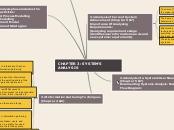CHAPTER 3: SYSTEM’S ANALYSIS
3.1 Analysis of Current System Achievement (Chapter 5 & 7) Importance Of Analysing Requirements:
(Analysing requirements stage identifies user information needs and new systems requirements)
To ensure that the new system will serve the needs of the organization
The design of the new system will be based on these determined requirements
Structured analysis has become a dominant technique for documenting user requirements providing methods to the systems analyst and business analyst
These systems are predominantly data-driven systems
3.2 Analysis of a System’s User Needs (Chapter 5 & 7) Documenting Systems Analysis- Data Flow Diagram:
The most widely used graphic presentation in the analysis phase.
Description of the system problems and proposed solutions will be written in narrative form.
Systems analysis – The process of gathering information about the existing system, which may or may not computerized, while identifying the system’s strength and problem.
Systems analysis phase includes the four main activities:
1. Data and Process Modelling
2. Object Modelling
3. Requirement Model
4. Development Strategies
3.3 Information Gathering Techniques
(Chapter 4 & 6)
1. Observation
Observing allows you to gain information that you cannot get by any other information gathering techniques
2. Interviews
Interview reveals information about the interviewee opinions and feelings about the existing state of the system, organizational and personal goals and informal procedures.
3. Review Of Documents
Written documents include manuals,
procedures, forms, reports etc.
4. Questionnaires
Questionnaires are used when there are a large number of users.
5. Joint Application Design
Joint Application Design is an information gathering technique that
allows a systems development team, users and management to work together in a highly focused workshop to identify requirements for the system.
6. Prototyping
A prototype is a model of a proposed system.
